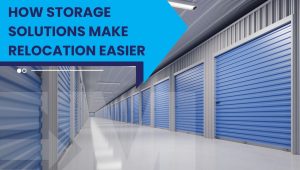
Relocating abroad is rarely a simple, one-step process. For many expats, the move happens in phases — selling a home, shipping belongings, securing housing overseas, and settling into a new lifestyle. In between these stages, there’s often a period when your belongings don’t quite fit into your timeline. That’s where storage solutions come in.
Temporary storage can be a lifesaver during an international move, giving you flexibility, peace of mind, and breathing room to organise your relocation without feeling rushed. This guide explains why storage is an important part of many international moves, and how to use it effectively.
Why Storage Matters in International Relocation
Moving abroad is different from moving across town. Delays, paperwork, customs clearance, and housing availability can complicate your timeline. Storage acts as a safety net, ensuring your belongings are safe until you’re ready to receive them.
Some common scenarios include:
- You’re leaving your current home before your new one is ready abroad.
- You want to move in phases (essentials now, furniture later).
- Customs delays extend the arrival of your shipment.
- You’re downsizing and aren’t sure which items you’ll need long-term.
Instead of stressing about mismatched schedules, storage offers flexibility.
Types of Storage Solutions for Relocation
1. Short-Term Storage
Short-term storage (a few weeks to a few months) is perfect for bridging gaps during your move. For example, if your container arrives at port but you can’t move in yet, a storage facility ensures your goods are secure.
2. Long-Term Storage
If you’re relocating temporarily or unsure about what to bring, long-term storage lets you leave belongings safely until you’re ready. This is common for expats on short work assignments.
3. Warehouse Storage
Relocation companies often provide climate-controlled warehouses where your goods are packed, sealed, and stored until delivery. This is ideal for furniture, appliances, and large shipments.
4. Self-Storage Units
Some people prefer self-storage, where they can access items independently. While this works locally, it’s less common for international moves due to customs and logistics.
Benefits of Using Storage During Relocation
1. Flexibility in Moving Phases
Not everything has to move at once. Many expats send essentials ahead (like clothes and electronics) and keep non-essentials in storage until they’re settled.
2. Stress-Free Transitions
Without storage, mismatched move-out and move-in dates can cause unnecessary pressure. Storage gives you time to plan calmly.
3. Safety and Security
Professional storage facilities are monitored, climate-controlled, and protected against pests and damage — far safer than leaving items in an empty house or garage.
4. Budget Management
Delaying the shipment of certain items can help spread relocation costs over time, making the financial burden easier to manage.
5. Downsizing Opportunities
If you’re moving to a smaller home abroad, storage allows you to keep items you don’t immediately need without giving them up permanently.
When to Consider Storage in Your Move
- Gap in housing: You’ve sold your home but haven’t secured housing abroad yet.
- Trial period abroad: You’re testing life in a new country before committing long-term.
- Corporate assignments: Temporary work postings may not require a full household move.
- Seasonal timing: Shipping furniture during one phase and personal items during another.
- Uncertain plans: You’re not sure how long you’ll stay abroad and don’t want to move everything at once.
How to Use Storage Effectively
1. Plan Ahead
Factor storage into your moving plan early. Knowing how long you’ll need it helps determine whether short-term or long-term solutions are best.
2. Choose a Reliable Provider
Work with a relocation company that offers integrated storage. This keeps everything under one provider, making logistics smoother.
3. Label and Inventory Your Items
Create a detailed inventory of what’s stored and what’s shipped. This avoids confusion later and makes customs clearance easier if needed.
4. Separate Essentials
Don’t store important documents, jewellery, or items you’ll need immediately. Keep those with you during the move.
5. Check Security and Conditions
Ask about climate control, pest protection, and insurance coverage. High-quality storage should keep your belongings in perfect condition.
The Role of Professional Relocation Storage
Unlike self-storage, professional relocation storage is tailored for international moves. CM Relocation, for example, offers:
- Secure, monitored warehouses.
- Professional packing before storage to prevent damage.
- Integrated logistics, ensuring smooth transfer from storage to shipping.
- Flexible options for short-term and long-term needs.
By bundling storage with moving services, you avoid juggling multiple providers and reduce the risk of delays or miscommunication.
Common Questions About Storage in Relocation
Is storage expensive?
Costs vary depending on volume and duration. Many movers offer bundled packages that make storage affordable.
Can I access my items in storage?
For international moves, access is usually limited for customs and security reasons. However, movers can arrange retrieval if needed.
What about insurance?
Most relocation companies offer insurance that covers your items while in storage. Always ask for details.
Should I store everything I don’t need?
Not always. Storage is best for valuable or bulky items you want to keep long-term but can’t bring immediately.
Relocating abroad is rarely straightforward, and few moves go exactly to plan. Temporary storage solutions provide the flexibility, security, and peace of mind that make international relocation easier. Whether you’re moving in stages, waiting for housing, or uncertain about what to bring, storage bridges the gap and simplifies the process.
With a trusted relocation partner like CM Relocation, storage isn’t just an afterthought — it’s part of a seamless, end-to-end moving strategy. By planning ahead and using professional storage facilities, you can take the stress out of mismatched timelines and focus on settling into your new life abroad.
